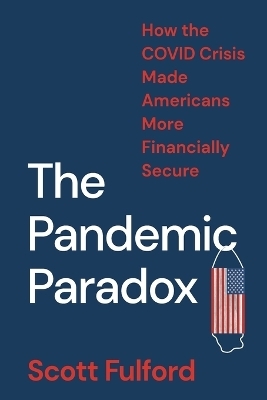
The Pandemic Paradox
How the COVID Crisis Made Americans More Financially Secure
Seiten
2025
Princeton University Press (Verlag)
978-0-691-24533-1 (ISBN)
Princeton University Press (Verlag)
978-0-691-24533-1 (ISBN)
- Noch nicht erschienen (ca. Februar 2025)
- Portofrei ab CHF 40
- Auch auf Rechnung
- Artikel merken
Why most Americans’ finances improved during the worst economic contraction since the Great Depression—and the policy choices that made this possible
In March 2020, economic and social life across the United States came to an abrupt halt as the country tried to slow the spread of COVID-19. In the worst economic contraction since the Great Depression, twenty-two million people lost their jobs between mid-March and mid-April of 2020. And yet somehow the finances of most Americans improved during the pandemic—savings went up, debts went down, and fewer people had trouble paying their bills. In The Pandemic Paradox, economist Scott Fulford explains this seeming contradiction, describing how the pandemic reshaped the American economy. As Americans grappled with remote work, “essential” work, and closed schools, three massive pandemic relief bills, starting with the CARES Act on March 27, 2020, managed to protect many of America’s most vulnerable.
Fulford draws from the Consumer Financial Protection Bureau's “Making Ends Meet” surveys—which he helped design—to interweave macroeconomic trends in spending, saving, and debt with stories of individual Americans’ economic lives during the pandemic. We meet Winona, who quit her job to take care of her children; Marvin, who retired early and worried that his savings wouldn’t last; Lisa, whose expenses went up after her grown kids (and their dog) moved back home; and many others. What the statistics and the stories show, Fulford argues, is that a better, fairer, more productive economy is still possible. The success of pandemic relief policy proves that Americans’ economic fragility is not an unsolvable problem. But we have to choose to solve it.
In March 2020, economic and social life across the United States came to an abrupt halt as the country tried to slow the spread of COVID-19. In the worst economic contraction since the Great Depression, twenty-two million people lost their jobs between mid-March and mid-April of 2020. And yet somehow the finances of most Americans improved during the pandemic—savings went up, debts went down, and fewer people had trouble paying their bills. In The Pandemic Paradox, economist Scott Fulford explains this seeming contradiction, describing how the pandemic reshaped the American economy. As Americans grappled with remote work, “essential” work, and closed schools, three massive pandemic relief bills, starting with the CARES Act on March 27, 2020, managed to protect many of America’s most vulnerable.
Fulford draws from the Consumer Financial Protection Bureau's “Making Ends Meet” surveys—which he helped design—to interweave macroeconomic trends in spending, saving, and debt with stories of individual Americans’ economic lives during the pandemic. We meet Winona, who quit her job to take care of her children; Marvin, who retired early and worried that his savings wouldn’t last; Lisa, whose expenses went up after her grown kids (and their dog) moved back home; and many others. What the statistics and the stories show, Fulford argues, is that a better, fairer, more productive economy is still possible. The success of pandemic relief policy proves that Americans’ economic fragility is not an unsolvable problem. But we have to choose to solve it.
Scott Fulford is a senior economist at the Consumer Financial Protection Bureau. He has a PhD in economics from Princeton University and he taught economic and international studies at Boston College before joining the CFPB. His academic and policy research examines the economic problems individuals and households face and how they use financial products to help deal with them. He lives in Washington, DC, with his wife and two young children.
| Erscheint lt. Verlag | 25.2.2025 |
|---|---|
| Zusatzinfo | 58 b/w illus. 7 tables. |
| Verlagsort | New Jersey |
| Sprache | englisch |
| Maße | 156 x 235 mm |
| Themenwelt | Sachbuch/Ratgeber ► Beruf / Finanzen / Recht / Wirtschaft ► Geld / Bank / Börse |
| Wirtschaft ► Betriebswirtschaft / Management ► Finanzierung | |
| Wirtschaft ► Volkswirtschaftslehre | |
| ISBN-10 | 0-691-24533-9 / 0691245339 |
| ISBN-13 | 978-0-691-24533-1 / 9780691245331 |
| Zustand | Neuware |
| Informationen gemäß Produktsicherheitsverordnung (GPSR) | |
| Haben Sie eine Frage zum Produkt? |
Mehr entdecken
aus dem Bereich
aus dem Bereich
Buch | Softcover (2022)
Ullstein Taschenbuch Verlag
CHF 19,55
1000 ganz legale Steuertricks : der Ratgeber für alle Steuerzahler …
Buch | Softcover (2023)
Knaur Taschenbuch (Verlag)
CHF 23,80
das Arbeitsbuch zur Steuererklärung für Rentner und Pensionäre
Buch | Softcover (2024)
Knaur Taschenbuch (Verlag)
CHF 20,95


